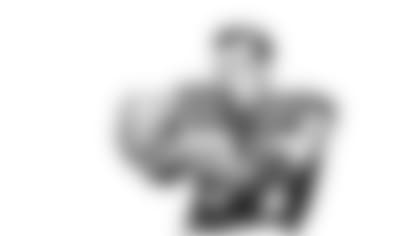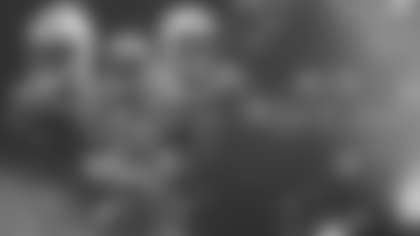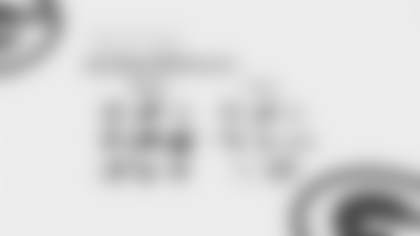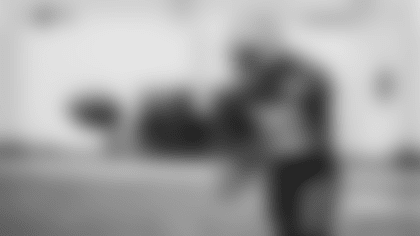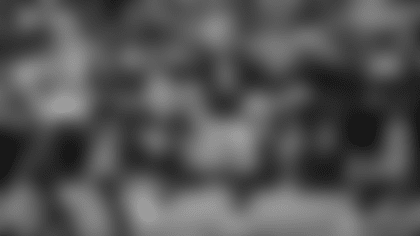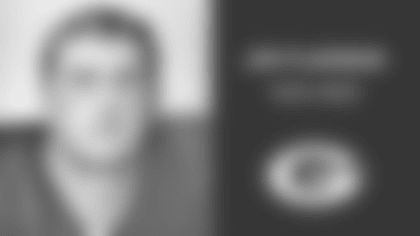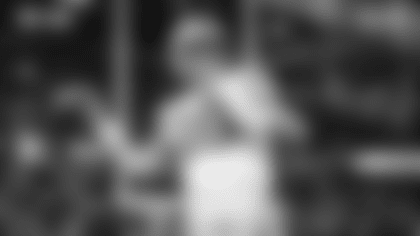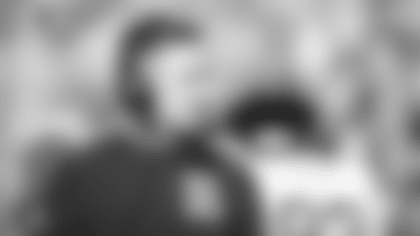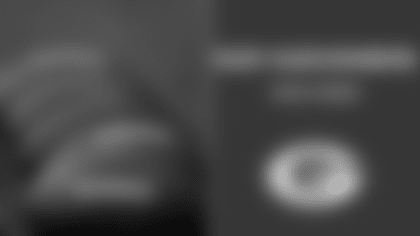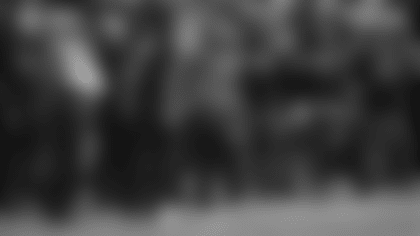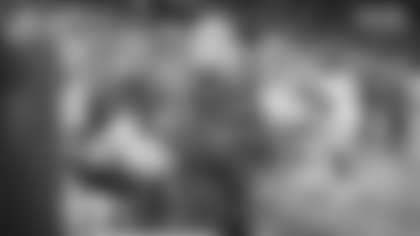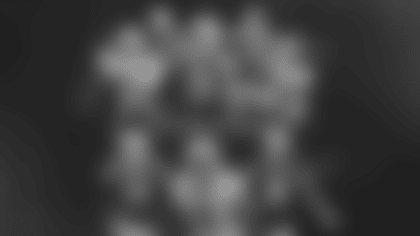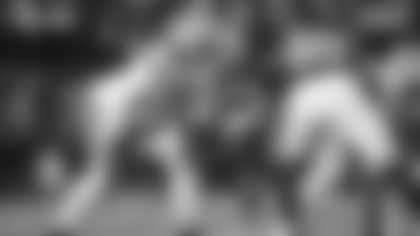Cliff Christl started gathering oral histories with former Packers and others associated with the team in 2000 and will continue to gather them as Packers historian. Excerpts from those interviews will be periodically posted at www.packers.com
Gary Knafelc played offensive end for the Packers from 1954-62. Best remembered for four fourth-quarter, game-winning catches in the late 1950s, he was inducted into the Green Bay Packers Hall of Fame in 1976. After playing split end early in his career, Knafelc started at tight end on Vince Lombardi's first two teams in 1959-60. Knafelc also was the public address announcer at Lambeau Field from 1964-2004.
On Tobin Rote, the Packers' starting quarterback in Knafelc's first three seasons and the quarterback of the Detroit Lions' last NFL championship team in 1957: "Tobin would have been a superstar today. Throw the ball. Smart. Competitor. Man, you never saw a competitor like that. Tobin was a great football player. Tough cookie. He always felt, 'If you aren't going to help me, give me the ball, I'll do it myself.' Quarterbacks, at the time, ran the offense. Tobin was the coach. I think that's why (Lisle) Blackbourn got rid of him. He was defiant. Blackbourn would say run this. And Tobin would say, 'OK, go in there and run your own play.' He didn't care."
On the Packers' first African-American quarterback, Charlie Brackins, who made it as a rookie in 1955 but was cut seven games into the season: "He had a good arm. He was a good athlete. He could throw the ball very well. He was a good quarterback. I think he could have played. I'm surprised someone else didn't pick him up."
On why Brackins was cut: "He missed curfew in Chicago, and they cut him right then. I assume that he was out partying."
On whether it was common back then for a player to be released for missing curfew: "I think he had been warned several times by Blackbourn. Blackbourn liked him. He told us he was going to be our quarterback, and we should act accordingly."
On the quarterback situation after Rote was traded to Detroit before the 1957 season: "We were always having problems. Rote was the No. 1 man, no question about it. Then when he left, it was up in the air. I really don't think (Blackbourn) knew who was going to be the quarterback. Bart (Starr) was very consistent. Babe (Parilli) was a little more flamboyant. He could run around, scramble and that kind of thing. They were entirely different types of quarterbacks. (Parilli) was a little more athletic."
On why he thought Vince Lombardi in 1959, his first season, kept Lamar McHan, Starr and Joe Francis as his three quarterbacks and cut Parilli, a five-year NFL veteran and former No. 1 draft pick who would play 10 more years in the American Football League and back up Joe Namath in Super Bowl III: "I can't answer that. I think when (Lombardi) made the decision, he wasn't going to shuttle quarterbacks. Babe was a loose cannon. He just had a good time, whereas Bart never deviated from the plan of Coach Lombardi. He understood Coach Lombardi and he understood his type of football."
On why he thought Lombardi kept Francis, who had been a single-wing tailback at Oregon State, over Parilli: "(He) thought 'Pineapple Joe' was going to be a great quarterback. He was a very good athlete. He had an average arm, but he could throw the ball pretty well."
On why he thought Lombardi chose McHan over Starr as his starting quarterback in 1959: "Once again, Bart was in a situation where the head coach didn't think he was the guy. See, Lamar and I were with the (Chicago) Cardinals together. Mac, physically, was a fantastic quarterback. Big, strong. But he was emotionally unstable. He was psycho. He'd get mad and do bad things. You never knew what he was going to do. If you dropped the ball, it was a personal thing. You did it because you didn't like him, which was unbelievable."
On why he thought Lombardi finally committed to Starr as his starting quarterback after he pulled McHan during the fifth game of the 1960 season against Pittsburgh: "Well, the first half, Pittsburgh was playing an over-shift zone to our tight end side… I told Mac, 'I can run the deep turn-in.' Then I said, 'The safety is ignoring me. If you can get him to come up, we can hit (Boyd) Dowler on a post and he'll be wide open.' We talked about that on the sidelines several times and he never threw the ball. The second half, we went into the locker room and Coach Lombardi started Bart. I don't know if it was the fourth or fifth play, (Starr) called the deep turn-in. Then we ran it about two more times. So he (Starr) said, 'OK, we're going to jack it.' I ran the turn-in, the safety came up and Dowler caught the deep post and walked about 20 yards into the end zone. That's how we won the game. After the game was over, Lamar came up to me and said, 'You didn't catch the ball for me.' I said, 'You didn't throw me the ball the whole first half.' He yelled at Dowler, 'You didn't catch the ball for me, either.' They were roommates. Dowler said, 'You didn't throw me the ball, how could I catch it?'"
On whether it was true McHan confronted Lombardi in a Green Bay restaurant that night after the team had returned from Pittsburgh: "Oh, sure. He got drunk on the plane. In fact, there were three of us sitting with our wives at Manci's (Supper Club). The ballplayers went out there, too. Coach Lombardi had the private room. Mac came in the door and I jumped up and walked up to him, 'What are you going to do?' He said, 'I'm going to tell that (a racial slur)…"
On what Lombardi finally saw that convinced him Starr was his guy: "I think Lombardi saw in Bart what I always saw. Bart was so quiet you thought nothing was going on. If you got Bart in a hole, he'd kick the (crap) out of you. He's a tough son of a (gun) who doesn't put on that image at all. He was a competitor: 'I'm going to prove to you that I'm better than you think I am.' Physically, he was not a Lamar McHan or a Tobin Rote. He was slight. A little clumsy. He wasn't an athlete. Ever see him play basketball? Terrible. He just couldn't do certain things. He had an average arm. But his anticipation of our routes was so precise and his angles of his throwing … So when I made my cut, the ball was right there."
On what allowed Starr to win five NFL championships: "… he never made the mistake. He never hurt you. He never made the bad throw. He never made the bad play. He was very quiet, yet very assertive and tough as they come."
On the importance of Starr's play-calling: "He called all the plays. Everything we did was because of the play-calling of Bart Starr. I'll bet he didn't have five plays a game called from the sideline. We were the first people that took film home and watched it. He watched film on my kitchen wall. We took film home even before he was starting. When he was behind Lamar McHan, he was doing it. We took film home Thursday and Friday. I was his roommate and the night before a game, I'd call out situations: 'Near side, 35-yard line, second-and-three. What do we call?' He'd go over plays. A constant student of the game."
On John Roach, Starr's backup in Knafelc's final three seasons from 1961-63: "He had a good arm, probably a better arm than Bart. But it's not how hard you throw the ball, it's where you throw the ball. Bart would throw you the ball with the point up. Easiest ball in the world to catch. Roach was accurate. He had a very good arm. But the amount of preparation Bart put in made him an exceptional quarterback on game day. (Roach) probably had more athletic ability than Bart, but that doesn't make him a better quarterback."
On joining the Packers in early October of 1954 and walking into a team meeting his first day when the offices were on Washington Street in downtown Green Bay: "They flew me in and they had a meeting upstairs. I went up there and I had on a black and white sport coat, a black shirt and a black tie. All the guys were in T-shirts. There was one seat in the very back of the room. It was very tight quarters. John Martinkovic and Dave Hanner were sitting there spitting tobacco in a coffee can. I said, 'Excuse me.' Martinkovic looked at me and I heard him say just as I got by him, 'I'll give him a week.'"
On Lisle Blackbourn, his first coach with the Packers: "Blackbourn was a good coach. He just didn't get along with the executive committee."
On the Packers locker room at old City Stadium: "That was under the stands at the stadium. That was the worst thing I ever saw in my life. We had mesh lockers with a wooden seat. It was terrible. Our whirlpool was a regular white porcelain tub with a hose in it."
On what it was like moving from old City Stadium to new City Stadium (now Lambeau Field): "It was like you had died and gone to heaven. If you've ever been in that old stadium, the equipment room had a dirt floor. In fact, the first time I went in there, they said, 'Go pick out some shoulder pads.' I walked in there and there were like three or four pairs of shoulder pads that were like grade school stuff lying on the floor. I called my father and had him send me the shoulder pads I wore in the College All-Star Game. I wore those for three years. We had nothing. Any high school was better. So the new facility was fantastic."
On his game-winning catch in 1955 against the then powerhouse Detroit Lions where the fans at old City Stadium stormed the field with 20 seconds left on the clock and carried him off on their shoulders: "It was crazy. Everybody from both sides of the stadium came into the end zone, picked me up and carried me off. There must have been 100 people or more. It was amazing. They picked me up right by the goal post where I scored, and they carried me off the field beyond the sidelines, almost to the bench. The officials made them put me down so they could get the game going. Otherwise, I don't know where they would have taken me."
On his game-winning catch in the first game at what is now Lambeau Field in 1957: "Babe (Parilli) was running for his life on the far left side and he just threw the ball in the end zone. I was kind of in a slot. I had run a post pattern, but he (Parilli) was running so hard to his left, I came back to the left side and found an open spot. That's where he saw me and he threw the ball behind me."
On Scooter McLean, Knafelc's second coach with the Packers in 1958: "Ballplayers will take advantage of whatever situation is presented to them. Ballplayers will always take the easy way out. If you don't push them, they will do what they want to do. Scooter would play poker with them the night before a ballgame in a room. (Max) McGee owned him. (McLean) was a terrible poker player. There was nothing to practices. It was entirely different from Blackbourn."
On Vince Lombardi trading four-time Pro Bowl offensive end Bill Howton before his first season as coach: "Bill and I were roommates at the time. I had met Coach Lombardi the day before Bill was coming in. It was quite shocking. Anyway, I got a phone call from Bill. He said, 'Meet me at the airport. Vince is having me come in and we're going to have lunch.' I said, 'Bill, I met with him yesterday. I sure wouldn't call him Vince.' He said, 'Oh, no, Vince wants me to come in and tell him what we have to do to win. Pick me up at the airport. I'll go have lunch with Vince. Then I'll take you and Emily out for dinner.' I said, 'Fine.' I picked him up at the airport and dropped him at the office downtown. I went home – the whole time couldn't have taken more than half-an-hour – and my wife says, 'Bill wants you to pick him up. He has to go back to Dallas.' I said, 'I just dropped him off.' She said, 'He's waiting for you.' So I drove back down and he's standing outside on the curb. I picked him up and said, 'What did you do?' He said, 'We had a nice talk.' I said, 'What did you talk about?' 'Nothing much.' I said, 'Aren't you going to have dinner?' He said, 'No, I have to fly back to Dallas.' He never told me what happened and the next day he was traded."
On the impression Lombardi created with that trade: "Howton was the self-proclaimed leader of the team. He was by far the best player we had at that time. Better than (Paul) Hornung, better than Max (McGee), everybody. Great receiver. But by (Lombardi) doing that, all of us thought, 'Holy smokes! Lombardi got rid of our best player.' Right away, he established that he was the boss and that it was either his way or the highway. Howton thought he was irreplaceable. And he was. He was a great football player. I was in awe of him."
On Lombardi's first meeting with the players at the start of his first training camp at St. Norbert College: "As soon as he talked to us, we all knew, 'Hey, this guy you don't mess around with.' I knew it when I first met him. That was enough for me. Then what he did to Bill Howton, you knew he was a no-nonsense guy."
On whether it was true that Lombardi ordered team President Dominic Olejniczak to leave the room at that initial meeting at St. Norbert: "He first walked in and he threw him out. He said, 'You don't ever come into any meetings I'm having with my players.' After our first meeting with Coach Lombardi, we knew exactly where we stood."
On whether Lombardi also was trying to send a message when he got rid of established starters Howie Ferguson, Al Carmichael, Jerry Helluin and Babe Parilli during his first camp: "I don't think that was the case at all. They were all getting toward the end of their careers. They were all good. Howie Ferguson was as good a fullback as you'd see anywhere. Howie was Howie. And Howie wasn't going to change for anybody. He worked in oil fields all his life. He was just a hard working – never went to college. He was a tough cookie. (But) he had some problems with his knee. (Helluin) was very good. He was about 270. He could move. He was quick. Al was a talent. He ran back kickoffs and punts. Al was the smoothest runner I think I've ever seen next to Gale Sayers. He was like a cougar. His head never moved. He was just very fluid. He was another one of those guys who didn't look like he was moving and all of a sudden he was by you. But no, no. They were just at that time. They were older players."
On whether the Packers were a confident team entering Lombardi's first season despite their 1-10-1 record the previous year: "Oh, I think so. Our practices had been very precise."
On the mood of the team prior to Lombardi's first game, the 1959 season opener against the Chicago Bears: "He had us ready to play that game on Wednesday. I still maintain that we were in the best shape of any team in the National Football League. All due to him. We all felt that if the game was even in the fourth quarter, we were going to win it. You look back – I'm not sure of this – I think we won an awful lot of games in the fourth quarter."
On Paul Hornung's leadership role: "Paul was a player's player. He could do it all. He could kick field goals. He could kick off. And Paul was a great guy to have on your ball club. He goofed around and laughed. But I'll tell you, when it came time to play, he was there."
On Hornung as a runner: "Paul was not the greatest speedster in the world. Actually, he probably was one of the slowest guys we had on our ball club. But when Coach Lombardi had us go up and diagram the plays, Paul knew where his blocking was coming from all the time. Look at how well he ran with those guards on the sweep. No one cut off his blockers better than Paul. No one set up his blockers better than Paul. If you look at Paul's great runs, they were not on the sidelines outrunning anybody. They were coming back against the grain and running with his blockers."
On Hornung's and McGee's reputations as playboys: "Hornung and Max -- I love them both. That was their claim to fame. They did it because they had to do it: Go out. They were the two bad boys. They had an image they had to live up to. …You (talked) to Max and he (didn't) talk about all the great catches he made, (he talked) about the night before. But Max was one of the smartest players on our team. Bart would ask people, 'What can you do? What plays can you get open on?' If he asked Max, he'd say, 'If it's third down and 12, and we're on the left hash-mark and he's standing on the outside, run me on a 14-yard turn-in and I'll take two steps to the right.' He was always precise. Very smart football player."
On Boyd Dowler, flanker on the 1960s all-decade team: "Boyd was way ahead of his time. He looked like he was lumbering down the field and all of a sudden he was by the corner. He had great speed for a guy that size. And he ran very precise routes."
On utility player Lew Carpenter: "He played fullback. He played wide receiver. He played slot back. And on the days we ran the other team's offense against the defense, he was quarterback. Heck of an athlete. Great baseball player, too. He could do anything. That's why Lombardi loved him."
On left tackle Bob Skoronski: "Skoronski always graded out, if not thee highest, one of the highest. Always. He was just a very good football player. Very smart. He didn't make mistakes. A great competitor. He acted very calm all the time, but the guys always said, 'Don't mess with him. He'd let you have it.'"
On guards Jerry Kramer and Fuzzy Thurston: "They were very similar, even in the fact they both loved to talk and tell stories. Both were very good players. I don't think I could give the edge to either one of them."
On the Packers' all-time interception leader and four-time Pro Bowl pick, safety Bobby Dillon: "Bobby Dillon was as good as they come. A student of the game. He studied offenses. He knew good receivers. He was never out of position. He had great timing. He anticipated pass patterns. Very good tackler. His angles of pursuit were always good. He was a great defensive back, no question."
Today, Knafelc lives in Clermont, Fla., just outside Orlando. The excerpts above were taken from interviews conducted with Knafelc in 2007, 2012 and this week.



